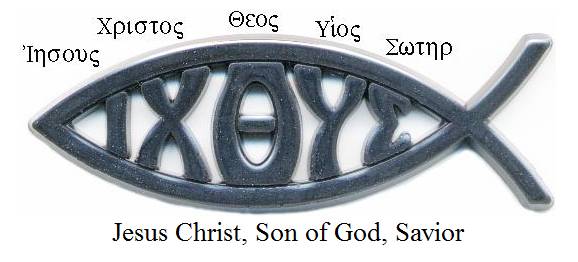| Greek | Meaning | Notes |
|---|---|---|
| ἀνάστασις, ἀναστσέως, ἡ | resurrection | Cognate: Anastasia |
| γνῶσις, γνώσεως, ἡ | knowledge | |
| δύναμις, δυνάμεως, ἡ | power | Cognate: dynamite |
| κρίσις, κρίσεως, ἡ | judgment | Cognate: critic, crisis |
| πίστις, πίστεως, ἡ | faith | |
| πόλις, πόλεως, ἡ | city | metropolitan, political |
| ἄστυ, ἄστεως, τό | town | |
| στάσις, στάσεως, ἡ | dissension | |
| ἱερεύς, ἱερέως, ὁ | priest | |
| ἀρχιερεύς, ἀρχιερέως, ὁ | chief priest | |
| βασιλεύς, βασιλέως, ὁ | king | |
| γραμματεύς, γραμματέως, ὁ | scribe | |
| ἁλιεύς, ἁλιέως, ὀ | fisherman | |
| ἰχθύς, ἰχθύος, ὁ | fish | |
| στάχυς, στάχυος, ὁ | ear of corn | |
| δάκρυ, δάκρυος, τό | teardrop | |
| ναῦς, νεώς, ἡ | ship | nautical |
| βοῦς, βοός, ὁ or ἡ | bull, cow | bossy |
Lexical Study
- Third declension vowel stem nouns end in ι, υ, or a diphthong and follow a similar pattern as the previously studied third declensions.
The ι-stem nouns
| Singular | |||
| NOM | πίστις | δύναμις | πόλις |
| GEN | πίστεως | δυνάμεως | πόλεως |
| DAT | πίστει | δυνάμει | πόλει |
| ACC | πίστιν | δύναμιν | πόλιν |
| VOC | πίστι | δύναμι | πόλι |
| Plural | |||
| NOM | πίστεις | δυνάμεις | πόλεις |
| GEN | πίστεων | δυνάμεων | πόλεων |
| DAT | πίστεσι | δυνάμεσι | πόλεσι |
| ACC | πίστεις | δυνάμεις | πόλεις |
| VOC | πίστεις | δυνάμεις | πόλεις |
-
- They are all feminine
- The stem is found by removing the ς in the Nominative singular
- ε replaces the final ι except in the Nominative, Accusative, and Vocative singular.
- ε unites with ι in the Dative singular to form a diphthong
- εις in the Nominative plural and Accusative plural is the result of the contraction of εες and εας respectively
- The accent of the Genitive singular and plural is irregular.
The υ-stem nouns
| Singular | |||
| NOM | ἰχθύς, ὁ | ἄστυ, τό | δάκυ, τό |
| GEN | ἰχθύος | ἄστεως | δάκεως |
| DAT | ἰχθύι | ἄστει | δάκει |
| ACC | ἰχθύν | ἄστυ | δάκυ |
| VOC | ἰχθύ | ἄστυ | δάκυ |
| Plural | |||
| NOM | ἰχθύες | ἄστη | δάκη |
| GEN | ἰχθύων | ἄστεων | δάκεων |
| DAT | ἰχθὐσι | ἄστεσι | δάκεσι |
| ACC | ἰχθύας or ἰχθῦς | ἄστη | δάκη |
| VOC | ἰχθύες | ἄστη | δάκη |
- The υ stem nouns of the third declension are
- Mostly masculine
- A few are feminine
- Very few neuter: δάκρυ and ἄστυ
- The stem is found by dropping the ς of the Nominative singular (except for the neuter word which already lacks the ς).
The diphthong stem nouns
| Singular | Plural | |
| NOM | ἱερεύς | ἱερεῖς |
| GEN | ἱερέως | ἱερέων |
| DAT | ἱερεῖ | ἱερεῦσι |
| ACC | ἱερέα | ἱερεῖς |
| VOC | ἱερεῦ | ἱερεῖς |
| Singular | Plural | |
| NOM | βασιλεύς | βασιλεῖς |
| GEN | βασιλέως | βασιλέων |
| DAT | βασιλεῖ | βασιλῦσι |
| ACC | βασιλέα | βασιλεῖς |
| VOC | βασιλεῦ | βασιλεῖς |
| Singular | Plural | |
| NOM | βοῦς | βόες |
| GEN | βοός | βοῶν |
| DAT | βοΐ | βουσί |
| ACC | βοῦν | βοῦς |
| VOC | βοῦ | βόες |
| Singular | Plural | |
| NOM | ναῦς | νῆες |
| GEN | νεώς | νεῶν |
| DAT | νηΐ | ναυσί |
| ACC | ναῦν | ναῦς |
| VOC | ναῦ | νῆες |
- Those that end in ευς are all masculine
- Locate the stem by removing the ς of the Nominative singular
- The final υ of the stem is dropped before an ending with a vowel
- In the Dative singular and the Nominative and Accusative plural, the same combinations as are found in the ι stem nouns appear.
Translate the following:
- οἱ μαθηταὶ τοῦ κυρίου ἐσθίουσι ἄρτον καὶ ἰχθὺν καὶ στάχυας.
- ὁ μεσσίας ἐκήρυσσε τὸ εὐαγγέλιον τοῖς ἁλιεῦσι καὶ οἱ ἀρχιερεῖς καὶ οἱ γραμματεῖς ἔπεμπον τοὺς δούλους αὐτῶν ἀκούειν αὐτόν.
- ἐσώθημεν τῇ χάριτι διὰ πίστεως.
- ἐν τῇ πόλει ὁ βασιλεὺς μένει, οἱ δὲ ἁλιεῖς παρὰ τῇ θαλάσσῃ
- ὁ θεὸς ἔχει τὴν δύναμιν κρίσεως ἐν τῷ κόσμῳ καὶ ἐν τῷ οὐρανῷ.
- οἱ ἱερεῖς γινώσκουσι τὸν νόμον, ἀλλ̓ οὐ γινώσκουσι χάριν καὶ πίστιν.
- ἐν τῇ ἀναστάσει τοῦ χριστοῦ ἐλάβομεν ζωὴν καὶ εἰρήνην.
- στάσις ἐν τῇ ἐκκλησίᾳ ἐστὶ κακή.
- ὁ βασιλεὺς ὁ ἀγαθὸς βλέπει τὴν ἡμέραν τοῦ κυρίου.
- λήμψεσθε δύναμιν ἀπὸ τοῦ θεοῦ καὶ ἔσεσθε οἱ μαθηταὶ αὐτοῦ.

